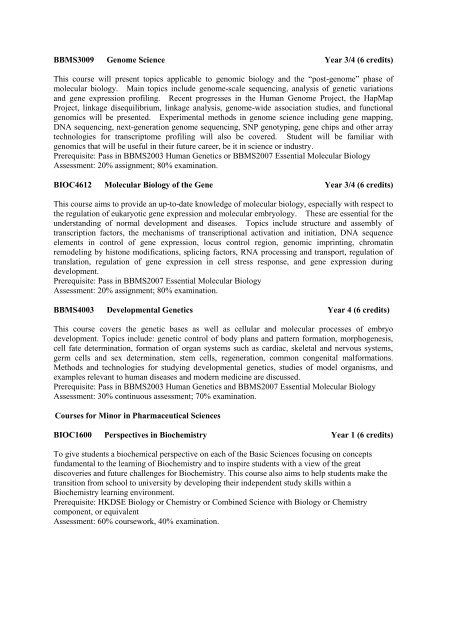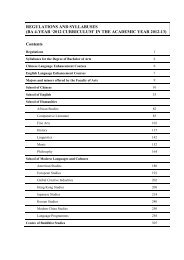Bachelor of Biomedical Sciences (BBiomedSc) - The University of ...
Bachelor of Biomedical Sciences (BBiomedSc) - The University of ...
Bachelor of Biomedical Sciences (BBiomedSc) - The University of ...
Create successful ePaper yourself
Turn your PDF publications into a flip-book with our unique Google optimized e-Paper software.
BBMS3009 Genome Science Year 3/4 (6 credits)This course will present topics applicable to genomic biology and the “post-genome” phase <strong>of</strong>molecular biology. Main topics include genome-scale sequencing, analysis <strong>of</strong> genetic variationsand gene expression pr<strong>of</strong>iling. Recent progresses in the Human Genome Project, the HapMapProject, linkage disequilibrium, linkage analysis, genome-wide association studies, and functionalgenomics will be presented. Experimental methods in genome science including gene mapping,DNA sequencing, next-generation genome sequencing, SNP genotyping, gene chips and other arraytechnologies for transcriptome pr<strong>of</strong>iling will also be covered. Student will be familiar withgenomics that will be useful in their future career, be it in science or industry.Prerequisite: Pass in BBMS2003 Human Genetics or BBMS2007 Essential Molecular BiologyAssessment: 20% assignment; 80% examination.BIOC4612 Molecular Biology <strong>of</strong> the Gene Year 3/4 (6 credits)This course aims to provide an up-to-date knowledge <strong>of</strong> molecular biology, especially with respect tothe regulation <strong>of</strong> eukaryotic gene expression and molecular embryology. <strong>The</strong>se are essential for theunderstanding <strong>of</strong> normal development and diseases. Topics include structure and assembly <strong>of</strong>transcription factors, the mechanisms <strong>of</strong> transcriptional activation and initiation, DNA sequenceelements in control <strong>of</strong> gene expression, locus control region, genomic imprinting, chromatinremodeling by histone modifications, splicing factors, RNA processing and transport, regulation <strong>of</strong>translation, regulation <strong>of</strong> gene expression in cell stress response, and gene expression duringdevelopment.Prerequisite: Pass in BBMS2007 Essential Molecular BiologyAssessment: 20% assignment; 80% examination.BBMS4003 Developmental Genetics Year 4 (6 credits)This course covers the genetic bases as well as cellular and molecular processes <strong>of</strong> embryodevelopment. Topics include: genetic control <strong>of</strong> body plans and pattern formation, morphogenesis,cell fate determination, formation <strong>of</strong> organ systems such as cardiac, skeletal and nervous systems,germ cells and sex determination, stem cells, regeneration, common congenital malformations.Methods and technologies for studying developmental genetics, studies <strong>of</strong> model organisms, andexamples relevant to human diseases and modern medicine are discussed.Prerequisite: Pass in BBMS2003 Human Genetics and BBMS2007 Essential Molecular BiologyAssessment: 30% continuous assessment; 70% examination.Courses for Minor in Pharmaceutical <strong>Sciences</strong>BIOC1600 Perspectives in Biochemistry Year 1 (6 credits)To give students a biochemical perspective on each <strong>of</strong> the Basic <strong>Sciences</strong> focusing on conceptsfundamental to the learning <strong>of</strong> Biochemistry and to inspire students with a view <strong>of</strong> the greatdiscoveries and future challenges for Biochemistry. This course also aims to help students make thetransition from school to university by developing their independent study skills within aBiochemistry learning environment.Prerequisite: HKDSE Biology or Chemistry or Combined Science with Biology or Chemistrycomponent, or equivalentAssessment: 60% coursework, 40% examination.
















